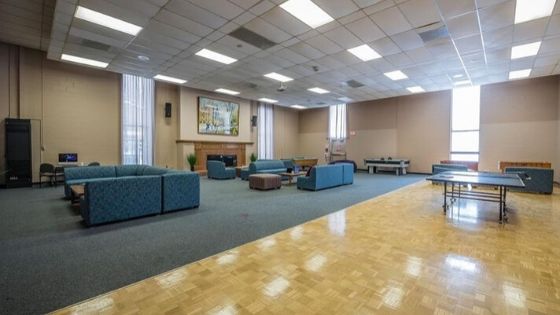Student Accommodation Options. Where Should You Stay?
Let’s think of a situation when you’ve arrived in the city where you’re going to start your study abroad experience. Despite the fatigue from a long flight, you’re overwhelmed with pleasant excitement. You’re heading to your accommodation place and you’re filled with lots of ambitious plans. The place you choose as your accommodation will be your home throughout your studies, so it’s important to approach the issue of choice responsibly. Especially for you, we prepared an article that will help you make the right choice between an apartment, hostel, and host family.
1. Dormitory

For many students who study abroad, living in a dormitory (or residence) is the most common accommodation option. A dormitory is a place where you’ll meet your best friends, find your second half and spend the most reckless student years. Many universities abroad offer dormitories on/off-campus. Listed below are some of the pros and cons of living in a student residence.
Pros
If you’re a sociable person and want to make new friends, then living in a dormitory is the type of accommodation you need. You’ll always have someone to communicate with. Shared rooms will promote even closer bonds with your new friends. Also, often students have common kitchens, recreation areas, etc. In addition, if you live in a student residence, you’ll have more opportunities to participate in sporting events, cultural groups, charitable organizations, etc.
Dormitory is the only type of accommodation that’s equipped with their own laundry and cafeterias, which will notably save your time. This is especially important during exams when every minute of yours counts. Neither the pile of dirty clothes nor hunger will distract you from preparing for the session.
Another advantage in favor of a dormitory is the convenience of the location. Very often they are located near the university campuses, libraries, and gyms. In the library, you can always prepare for critical exams in silence, as well as use academic sources to write a thesis. The laptop stopped working? Don’t worry! There’s always a computer lab on campus with which you can complete what you’ve started.
Another advantage of choosing a dormitory as your accommodation is that living there is often cheaper than off-campus. As a rule, this applies to payment of individual bills, such as the Internet, telephone and electricity. In addition, you don’t even have to think about transportation costs. No costs for bus, train, and taxi!
Cons
Sometimes the cost of a separate room in a dormitory can cost a pretty penny. Make sure to choose an option in the catalog that suits you and your pocket. You can always save by taking a shared room.
In a dormitory, you may be asked to share the many benefits of civilization with your comrades, such as the kitchen, lounge, etc. In some cases, you may have a shared bathroom. Some students may feel not well with this situation.
Although you’ll meet many different friends in your dormitory, and this is undoubtedly an advantage, they can also distract you in critical moments, such as exam sessions.
In dormitories, as elsewhere, there are rules. Whether you like it or not, you have to follow them. For example, some hostels may not allow your visitors to stay overnight. Others may ask you to be quiet when your favorite football team is playing. Life in a dormitory is accompanied by some restrictions.
2. Host Family

Housing with a host family is a common type of accommodation in the West. This is one of the types of accommodation that involves staying in a host family during your studies. In the host family, you’ll spend unforgettable days, as well as have memories for the whole life. Staying in a host family won’t leave anyone indifferent. Why? Continue reading about the advantages and disadvantages of living in a host family.
Pros
It’s impossible to overestimate the benefits that the host family can provide you, especially during the first time you are abroad. The family will help with everything that may be required on your debut days, explain to you where to go and what to do, and share their experience based on many years of living in the city.
A host family will become a door to a foreign domestic life, it’ll give you the opportunity to learn more about the culture and traditions of different groups of people. You, in turn, can talk about the culture and life of your country, thereby cultural exchange will take place between you.
Staying in a host family while studying abroad is the best accommodation option to improve your knowledge of a foreign language, being in constant contact with its native speakers. You’ll have to speak in a foreign language, and this will undoubtedly expand your vocabulary, acquire a local accent, learn popular idioms, and help to advance your spoken language.
The last advantage, which is worth saying a few words, is that in a host family, you don’t need to do any household chores, except perhaps to clean your room. The rest will be taken care of by the house owners themselves.
Cons
Despite the advantages stated above, a host family also has its drawbacks. For example, a drawback is a limited independence you’ll have. You must understand that you’re going to another family, in which you’ll have to take into account the rules of your host family regarding many things: cleaning, daily routines, traditions, usage of kitchen, etc.
The family, in addition, undertakes to ensure your safety and therefore may worry about your absence at home at night and may ask to report your whereabouts.
A linguistic and cultural barrier can push you away from communication with your new family, as the host family will most likely be a native speaker of another language, as well as a representative of a different nation and culture. Since we live in an era of liberal values and digital opportunities (Google Translate will help you!), this shouldn’t be a big barrier at first glance. But still, take it into consideration.
Apart from your own room, you may not find another place in the house where you’ll feel privacy. In the kitchen and in the living room, the feeling of discomfort may not leave you, especially if your host family is too prim.
3. Apartment

If you care about your privacy, prefer that no one could disturb your comfort zone – renting a private apartment during your studies abroad will be the best accommodation option. Here are some pros and cons of renting a private apartment while studying abroad.
Pros
An apartment gives you much more space for action and movement. You won’t have any curfew or rules that you are required to follow in any other type of accommodation.
In addition to freedom of action, in an apartment, you’ll have the freedom to choose your own meals. You can buy products that you prefer, cook your own food and manage your home the way you want. You don’t have to cram your products into someone else’s refrigerator and eat broccoli that you hate.
One of the main advantages of living in an apartment is that you can always find cool flatmates to help you reduce accommodation expenditures and share daily domestic chores. You can also set specific rules that you both will follow.
You can choose an apartment near your school or away from the bustle of the city. You can rent an apartment next to some old cathedral or away from the city and closer to the bosom of nature. Only you choose!
Cons
Renting a private apartment can seriously upset your pocket due to the high cost of housing in most of the leading educational countries. You can always rent a cheaper housing, but try to find an apartment closer to your institution.
Choosing a private apartment as your accommodation place means that you should be responsible for planning your stay and paying utilities, such as water, electricity, internet, and gas. Keep in mind that utilities can be much more expensive than in your country. In addition, you’ll have to buy or rent household items such as forks, plates, knives, and electronics.
Independent living in an apartment implies independence in everything: you must do all the housework, take out the trash, clean the bathroom, cook food, wash dishes, iron clothes, etc. Those who’ve lived a student life, are aware of the value of free time. Unlike students on a campus, you can’t afford to mess around, as you risk leaving no time for study.
So, as you can see, living in a hostel, in a family, and in an apartment have their own advantages and disadvantages. Here everyone will choose what suits his or her tastes and desires. Anyways, we hope that your study abroad experience will be unforgettable!
P.S. Psht! Did you decide where you want to study abroad? If not, visit Aplic.io and disperse your hesitations by choosing a university of your dreams! Just sign in, check thousands of universities and programs, and apply within just a few minutes! If you’re uncertain about an accommodation type you want to choose, we’ll help you pick the most fitting one!

